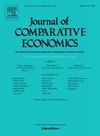The growth consequences of socialism
IF 2.8
2区 经济学
Q1 ECONOMICS
引用次数: 0
Abstract
The discussion of the growth consequences of socialism has fulminated for a century, sparked off by the Calculation Debate in the 1920s and 30s, and has concerned the performance of the Soviet Union in the 1950s and the mixed development in the 1990s after communism collapsed in Central and Eastern Europe. We aim to inform these debates by providing an empirical assessment of how socialist economies performed across the second half of the 20th century. Using both neighbour comparisons as well as more formal empirical analysis of developing countries that turned socialist after independence, we derive a set of estimates of the degree to which the introduction of a planned socialist economy affects long-run growth and development. Our results robustly point towards a decrease in annual growth rates of approximately two percentage points during the first decade after implementing socialism.
社会主义发展的结果
关于社会主义增长后果的讨论已经持续了一个世纪,由20世纪20年代和30年代的“计算之争”引发,并涉及到20世纪50年代苏联的表现,以及20世纪90年代共产主义在中欧和东欧垮台后的混合发展。我们的目标是通过对社会主义经济在20世纪下半叶的表现进行实证评估,为这些辩论提供信息。通过对邻国的比较以及对独立后转向社会主义的发展中国家的更正式的实证分析,我们得出了一组关于引入计划社会主义经济对长期增长和发展的影响程度的估计。我们的研究结果有力地表明,在实行社会主义后的第一个十年里,中国的年增长率将下降大约两个百分点。
本文章由计算机程序翻译,如有差异,请以英文原文为准。
求助全文
约1分钟内获得全文
求助全文
来源期刊

Journal of Comparative Economics
ECONOMICS-
CiteScore
4.40
自引率
0.00%
发文量
66
审稿时长
45 days
期刊介绍:
The mission of the Journal of Comparative Economics is to lead the new orientations of research in comparative economics. Before 1989, the core of comparative economics was the comparison of economic systems with in particular the economic analysis of socialism in its different forms. In the last fifteen years, the main focus of interest of comparative economists has been the transition from socialism to capitalism.
 求助内容:
求助内容: 应助结果提醒方式:
应助结果提醒方式:


